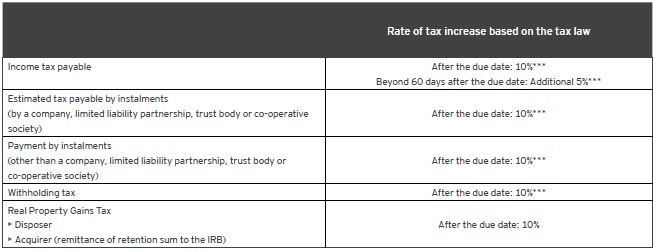Waiver and remission of tax penalty
The Malaysian Inland Revenue Board ("IRB") has recently announced that there will be a waiver and remission of tax penalty to encourage voluntary disclosures and early settlement of tax arrears.
How can this benefit you?
- Opportunity to resolve tax disputes
- Waiver of tax increase (late payment penalty) for tax arrears: Income tax, withholding tax and RPGT*
- Remission of penalty for voluntary disclosure of non-submission or late filing of income tax return forms
- Remission of penalty for voluntary disclosure of incorrect returns filed
- Remission is for a limited time frame: 1 May 2015 to 30 November 2015
Source:
" IRB's media release on "Reduction of Penalty And
Waiver of Tax Increase for Voluntary Disclosure And Early
Settlement of Tax Arrears" dated 24 April 2015
Note:
*RPGT denotes Real Property Gains Tax
Taxpayers deriving income from Malaysia and looking for opportunities to regularise their tax positions may apply for the reduction of penalties and/or waiver of increase of tax.
Who can apply?
| Multinational companies ("MNCs")* | Local companies* (including small and medium enterprises) |
| Individuals | Others (including body of persons, limited liability partnership, corporation sole, trust companies) |
Note:
*Excludes companies whose tax files are handled by the
Multinational Tax Branch or the Petroleum Branch of the
IRB
Recommended for:
| MNCs and local companies |
|
| Individuals |
|
Current tax penalty regime
The tables below set out the current penalty regime under the tax law and the concessionary rates applied by the IRB in practice:
1) Concessionary rate of penalty

2) Rate of tax increase

Notes:
*Rates of penalty for the late submission of tax returns are
extracted from the "Garis Panduan Operasi Bil. 1 Tahun
2015" issued by the IRB on 5 March 2015.
**Based on the Tax Audit and Tax Investigation Frameworks
***Based on the Income Tax Act 1967
Amnesty regime
The recent IRB announcement aims to reduce the current concessionary penalty rates and waiver of tax increase. However, the amnesty* does not indicate the rate of reduced penalty.
Key areas to note:
- Merit based
Depending on IRB's discretion based on the merits of the case - Tax review
Possibility of a tax audit by the IRB - Open years
Not clear on the years of assessment to be audited by the IRB - State of
documentation
Ability to retrieve relevant documentation - Short time frame: 30 November
2015
Short period of time for applicants to perform a tax health check
Notes:
*The IRB's conditions for amnesty are outlined as
follows:
> The eligibility of the offer depends on the merits of the
taxpayer's case
> It is subject to relevant regulations issued by the IRB
> It is not applicable to taxpayers whose tax files are handled
by the Multinational Tax Branch or the Petroleum Branch of the
IRB
You can consider...
Before approaching IRB:
- Ascertain your tax status (payable / refund) for each year of assessment
- Undertake a health check on the tax returns for the past 3 to 5 years of assessment
- Undertake a withholding tax review on payments made to non-residents
- Undertake a means test or capital statement review in the last 5 years of assessment (for individuals)
- Formulate a submission strategy
The content of this article is intended to provide a general guide to the subject matter. Specialist advice should be sought about your specific circumstances.
